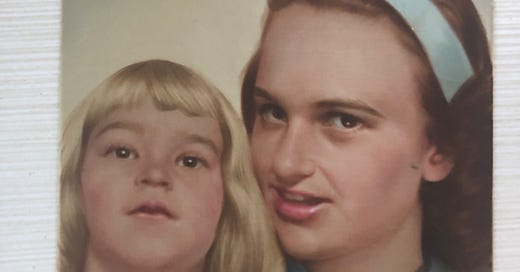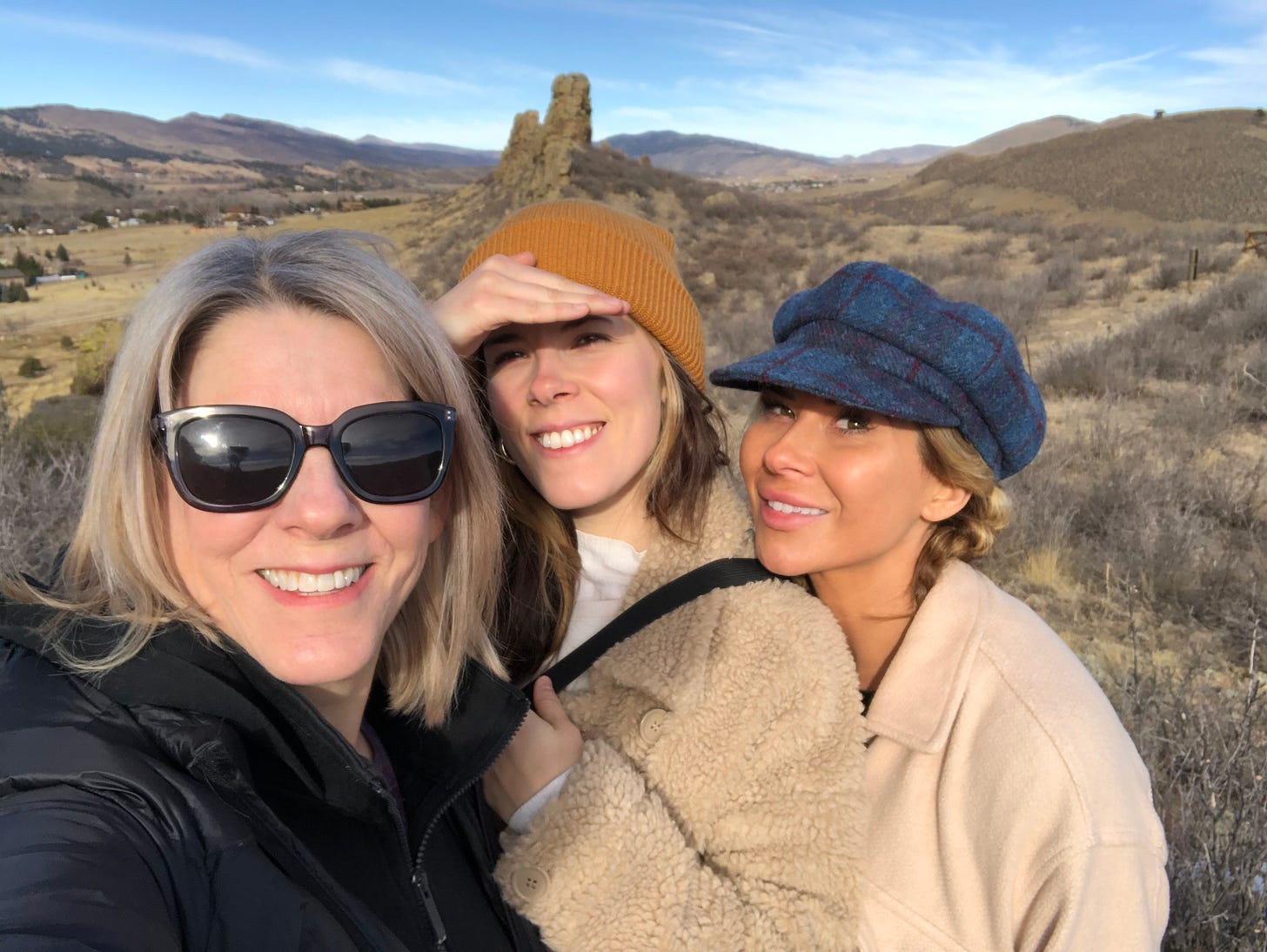Reclaiming Mother’s Day
Part 2: Learning to Hold Both Grief and Gratitude. "Healing isn’t erasure. It’s not pretending the loss didn’t happen. It’s learning to carry it differently, and letting Love write a new story."
This reflection is part two of a four-part series called Becoming the Mother I Needed: A Four-Part Series on My Journey to Heal the Mother Wound, which explores mothering and healing in the shadow and light of Mother’s Day. Each essay stands on its own, but together they trace a deeper journey —from inherited pain to intentional presence, from loss to reclamation. If you missed part one, you can find it here.
For years, Mother’s Day was a wound that reopened each spring.
It wasn’t just the pain surrounding my runaway mother’s abandonment or the silence of decades of estrangement. It was the pull of memories, the unanswered questions, and the sharp contrast between my lived experience and the warm-hearted celebrations happening all around me.
Since all women are daughters first, the season can stir ancient longing for the mother we wanted. The one we lost or the one we never fully had. The emotions can be wildly contradictory: love and resentment, joy and sorrow, grief and gratitude, longing and relief. Sometimes, a parade of feelings can all erupt at once, like circus clowns tumbling out of tiny cars. Boy, howdy.
Before my daughters were born, Mother’s Day felt brutal. My grandmother and I shared a quiet bond in those years. I missed my mother. She missed her daughter. And though we couldn’t fill the absence, and could barely talk about it, we leaned into each other. Our relationship didn’t replace our shared loss, but it softened the ache. My grandmother’s love gave me something steady to hold on to, and I know mine did the same for her. We were fortunate to have each other during those difficult years, and still, at the end of the day, a girl wants her mom.
I remember how the Mother’s Day season used to sneak up on me.
Suddenly, the mounting hoopla of Mother’s Day was everywhere. You couldn’t escape it. In the flood of marketing. In the smiling photos and the glowing tributes on Facebook. In the picture-perfect brunches and beaming mothers holding roses at church. I have nothing against any of those expressions, but back then, it felt like the whole world was gearing up for a motherhood party I wasn’t invited to. The cultural messages proclaimed that mothers were ever-nurturing, present, supportive, and adoring. But I didn’t see my relationship with my mother reflected in that script. And that disconnect made the day even harder to bear.
Sometimes I felt bitter. Sometimes, just numb, pushing down the pain.
Most years, I avoided going anywhere near the greeting card aisle. On others, I’d find myself there anyway, opening cards and sort of torturing myself by reading words overflowing with love and gratitude, imagining what it would feel like to mean them. To have a mother who made me feel devotion instead of betrayal. And yet I missed her. I didn’t just miss my mother, I missed the kind of mother others seemed to have.
I’ve spent a long time missing my mom, and I suppose on some level, it became a habit—the missing. Even when I told myself I didn’t need her anymore. Even when I tried to be strong. There was still a part of me waiting. Waiting for her arms. Her return. Her desire to be my mom.
Over time, I learned to carry that emptiness without letting it swallow me. But it took years. And even as life moved forward, with the births of my beloved daughters, there could still be grief that tugged at the edges of the day.
The ache in me softened as I became a mother myself.
It was the love of my husband and daughters, and a fierce determination to do things differently, that helped me begin to redefine mothering and Mother’s Day. Their love couldn’t undo my past, but it could wrap it in something steady enough to hold it all. And held in the ocean of my little family’s love, my heart began to heal.
Healing isn’t erasure. It’s not pretending the loss didn’t happen. It’s learning to carry it differently, and letting Love write a new story moving forward.
When Mother’s Day arrived, I no longer had to shape the day around the mother I didn’t have. I could let it be about the mother I was becoming. We made room for a new story, one rooted in presence, repair, truth-telling, and love freely given and received.
I think most mothers try to give their children what they themselves didn’t receive. But over time, I realized my daughters weren’t carrying the same fears I had. I don’t think, for example, that they ever worried I would leave them. So learning to mother them meant letting go of the idea that I had to fill the gaps of my own childhood. It meant learning to give not just what I once needed, but what they truly needed. That kind of shift doesn’t happen overnight. It’s something we keep learning, moment by moment, as we grow alongside our children.
Decades later, my relationship with my now-deceased mother and with Mother’s Day has evolved. It’s been a long road to get here, but it feels whole and sacred to tell the truth of my history without needing to explain it away, pretend it didn’t happen, or pretty it up with roses and hearts. It’s about holding space for the ache and for the healing, for the woman I lost and the woman I’ve become in her absence.
The deep work I’ve done to come out of denial and tend the wounds I carried because of her actions has yielded profound rewards—gifts of clarity, recovery, and hard-won peace. I’ve learned to meet my mother’s pain with compassion, while holding her accountable for her actions, even as I continue to feel and heal the impact of her choices.
And honestly, I couldn’t have developed the mothering ways I am most proud of now had I not had the mother I had then. I really get that now.
Years ago, I stood in the greeting card aisle before Mother’s Day, reading loving words and feeling the ache of what was missing. But now, I receive those very words from my daughters—tender, honest, full of love. Not because I’ve somehow become some flawless version of a mother (oh honey, no), but because they know they are deeply, undeniably loved, and I am loved in return. I honor the path that brought me here, the love that has deepened with time, and the healing still unfolding.
So maybe, more than anything, Mother’s Day is about what love can do when it doesn’t remain stuck as a painful echo of the past, but is alive and evolving in the present.
These days, I look forward to Mother’s Day and spending time with my daughters, one of my favorite things to do. I honor the complex journey it has been. I honor the truth of what was, what wasn’t, and what we, together, can choose to grow in its place.
That, to me, is something worth celebrating.
If Mother’s Day is hard for you, I want to say this: it’s okay to feel it all.
You don’t have to celebrate what was never given, and you don’t have to pretend the day doesn’t affect you. But over time, you may find there is space to shape it into something that feels more honest, more yours. You can mark it with reflection, or rest, or ritual. You can honor your story without smoothing its edges. And slowly, gently, you can begin to reclaim the day, not by erasing the past, but by rooting more deeply into the love you give and receive now. There is no wrong way to hold it. There is only the invitation to hold it with truth.
For Your Own Reflection
If Mother’s Day brings complexity, longing, or quiet sorrow, you are not alone. These questions are here to support your own reflection, whether in writing, prayer, or simply in your heart.
What expectations or cultural messages about motherhood have shaped your experience of this day?
Is there a story you have told yourself about your mother, or your experience of mothering, that is asking to be revisited or gently revised?
In what ways have you already begun to reclaim this day as your own?
What rituals, practices, or boundaries might help you hold this day more kindly and truthfully?
Who are the people who have mothered you in meaningful ways? Who have you mothered, beyond biology?
What would it look like to honor both the grief and the love that coexist in your story?
How have you learned to mother yourself?
Take what resonates, and leave the rest. May your truth feel welcome here.
Love,
xo Mary
Coming Next Week: When Your Story Doesn't Fit the Formula ( May 18)
In Part 3, I explore what it means to face the truth about my mother’s choices—and begin to heal from a story that never fit the cultural script. From greeting card clichés to tropes of selfless, sacrificial mothers, we’re surrounded by myths about what mothers are supposed to be. If your story has ever felt too messy, too painful, or too different to name, I hope you’ll join me.







Hello Mary
I love the weaving of honesty, repair, and acceptance.
Beautiful writing.
It’s so rare to read a mother’s abandonment story. Thank you for sharing of yourself. I also had a teen mom, divorce and a remarriage that took her away from me emotionally. My grandmother raised me in many ways. But, it was the final abandonment the year my twin daughters were born that brings on the ache. She moved 700 miles away that year — 19 years ago. Still alive but you can’t have a relationship with an emotionally detached human living that far. Anyway, thanks for making space for me to share my tiny story. It’s a hole hard to fill.